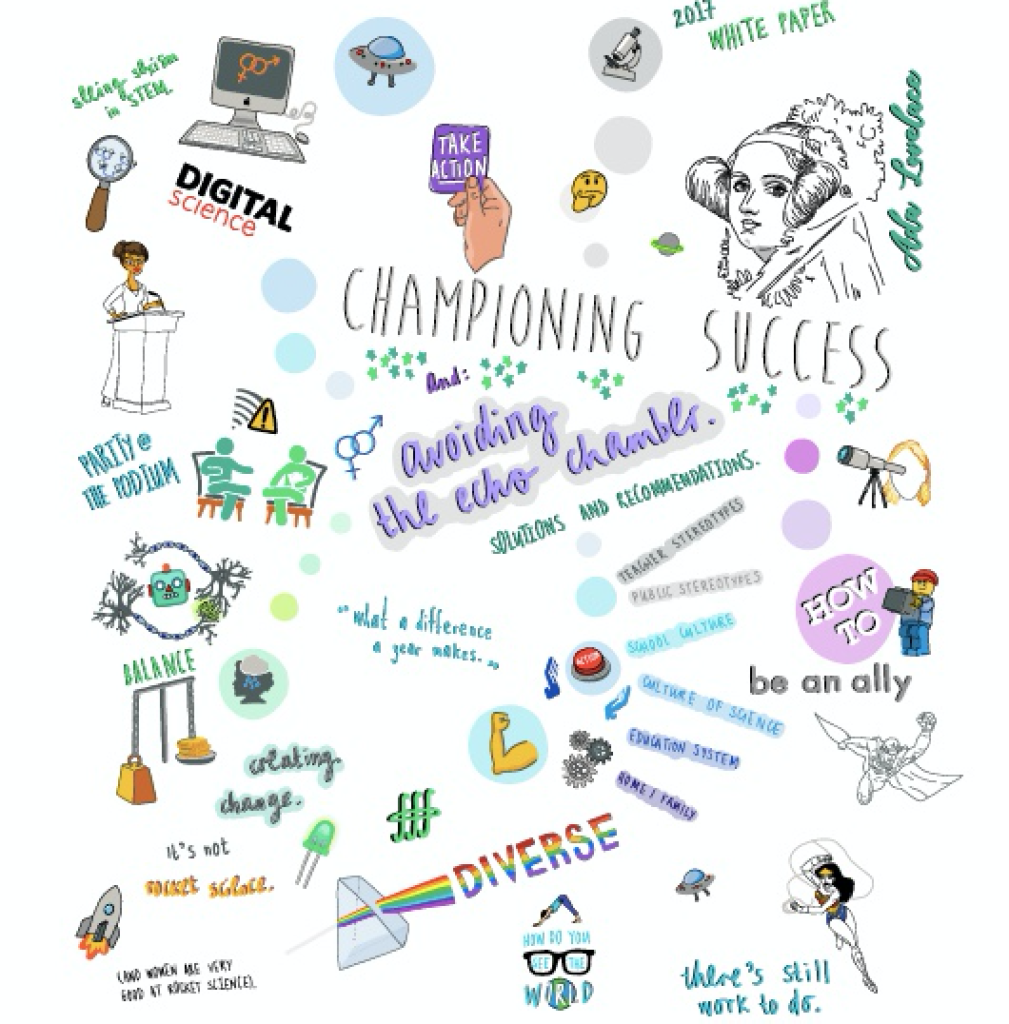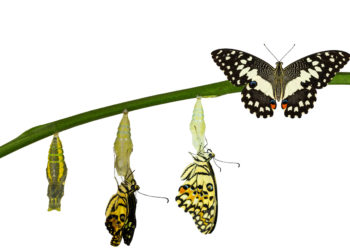Hands up if you’ve heard of Ada Lovelace! If you have, chances are it’s because of the efforts of Suw Charman-Anderson, a long-time supporter of women in science, technology, engineering, mathematics, and medicine (STEMM) and founder of Ada Lovelace Day (ALD), which today celebrates its eighth anniversary.

Lovelace herself was “was an English mathematician and writer, chiefly known for her work on Charles Babbage’s proposed mechanical general-purpose computer, the Analytical Engine”. To recognize her work and in celebration of ALD, Digital Science, a strong supporter of women in STEM, has published a new report: “Championing the Success of Women in Science, Technology, Engineering, Maths, and Medicine: A collection of thought pieces from members of the academic community” (disclosure: I am co-author of one of the contributions).
Scattered throughout the report are many clear indications of what we are up against, and why we need to act as a community to ensure more equal participation by women in STEM subjects and in scholarly communications more generally. For example:
- Women make up 63% of the academic publishing workforce and men 36%, but men are better represented in high-profile, revenue-generating roles such as technology (24% vs. 12% women), new ventures (25% vs. 18%), and management (50%, vs. 44%)
- The number of girls studying science at GCSE level (UK) is almost equal numbers to boys in the UK, but by the time they choose a degree there are clear differences, and when it comes to employment, most people working in STEM subjects are men
- 75-80% of the funding for 6,000 infectious diseases studies was awarded to male principal investigators – no matter which way the data were cut
- Only around 30% of researchers worldwide are women and, in the USA, only 24% of STEM jobs are held by women (some disciplines, eg, engineering have a significantly worse gender bias)
- 70% of Silicon Valley, workers at major employers such as Google, Apple, and Facebook are men
But it’s not all doom and gloom, and – channeling my inner Suw Charman-Anderson (“We need to gather and share our success stories, not just to show ourselves that we’re having an impact, but to show the world that times are indeed changing, and that equality is achievable”) – I’m happy to share some of the good news in the report, as well as thoughts from some of the contributors on how we can effect change.
From the UK, Rhianna Goozee reports on the Equality Challenge Unit’s (ECU) Athena SWAN charter, which aims “to encourage and recognize commitment to advancing the careers of women in STEMM employment in higher education and research.” It uses Bronze, Silver, and Gold awards to encourage organizations to move from self-assessment and developing an action plan (Bronze) to becoming “beacons of achievement in gender equality [who] should champion and promote good practice in the wider community” (Gold). Although only eight out of 669 award-holders in the UK have achieved Gold status so far, this kind of initiative, with its emphasis on setting targets, continuous monitoring and evaluation, and a community approach, provides a really helpful framework for organizations that are genuinely committed to addressing gender inequality. Encouragingly, in an evaluation of the initiative, both women and men at Athena SWAN award organizations report “greater career satisfaction and access to career development opportunities.” And interestingly, some funders, including the National Institute for Health Research, are starting to require applicants to be Silver or Gold awardees. To quote Michael Head (whose piece also highlights Athena SWAN): “In a distinctly tricky climate for UK universities (funding cuts, Brexit, etc) the threat of missing out on high-profile sources of research investment makes for an interesting motivation to ensure compliance with funder rules.”
Individual organizations and institutions are also driving their own change. Kimberley Kowal Arcand notes that Carnegie Mellon University’s efforts to improve the gender balance in their computer science program, through better networking and mentoring opportunities, have led to 40% of the incoming computer science majors being women. Likewise, a redesign of the Computer Science 101 course at the University of California, Berkeley has resulted in more women enrolling in the course than men. And over at NASA, a full 50% of the current eight astronauts in training are women, compared with just 75 of the 560 people who’ve trained as astronauts to date. (As an interesting aside, Kowal Arcand mentions a logistical problem facing women, in particular: “Spacewalks require special suits that are not tailor made, but rather come in medium, large and extra-large sizes. Recently retired astronaut Cady Coleman, for example, at 5’4” is likely NASA’s smallest astronaut able to wear a spacewalk suit; astronauts smaller than her would not be able to fit in and maneuver around in the spacewalk suit.“)
Changing organizational behavior is clearly critical to improving equality but, just as important, is changing our own behavior. Tracey Armstrong, President and CEO of the Copyright Clearance Center (CCC) is a firm believer in the power of women having responsibility for revenue, based on her own experience. She owned her first revenue line in her 20s and, since she became CEO, CCC’s revenue has grown by nearly $200m. Her number one piece of advice for women, therefore, is to move into a position where you can own revenue. She also recommends getting a mentor, and not making excuses for living your life – or, as she puts it: “Women are more like Velcro: taking on the burdens of others and inadvertently setting themselves back. Don’t be Velcro.” (I am definitely guilty as charged…)
Buddhini Samarasinghe is the founder of STEM Women, an initiative that “celebrates the careers of women in STEM fields while highlighting the many difficulties we face.” She points out that one of the challenges is actually recognizing bias, never mind addressing it. How do we deal with the male colleagues who only talk to us about social issues, and only talk to other men about their research? When is it okay to ask a man not to monopolize the conversation? How do you tell a well-intentioned male colleague that he is marginalizing you? As Samarasinghe notes: “While the trolls are easy to spot, it is much harder to point out the blind spots that fester in well-meaning colleagues who believe they are being fair.”
Changing organizational behavior is clearly critical to improving equality but, just as important, is changing our own behavior.
Bastian Greshake Tzovaras’ contribution is a nice counterpoint to Samarasinghe’s. He has plenty of suggestions for his fellow men on how they can help level the playing field, which can be summed up as: “maybe the single best, most actionable thing is this: step back, shut up, give women space, and listen to them.” Among his specific recommendations is to look at who is actively participating in your community, including at conferences and other events. We should all be asking conference organizers about their gender balance policy – and their diversity and inclusion policy more generally. Suggest additional speakers if there’s not a good balance of voices, and decline the invitation if you’re invited to speak on an #allmalepanel!
Greshake Tzovaras’ piece, in turn, is a good segue into the update from Lauren Kane and me on our 2016 community call to action on improving the gender balance of speakers at scholarly communications conferences. We have been much encouraged by both the changes we’ve seen in the proportion of women speaking at industry events and, equally, by the personal stories people have told us about how they’ve changed their own behavior. In purely numerical terms, we were delighted to find that the average representation of women speakers at the seven conferences we analyzed in 2015 has increased from 37% to 48% for events held between June 2016-May 2017. At an individual level, we are delighted to share feedback from several individuals: “A mid-career woman who usually turns down speaking opportunities decided to accept one (and, despite her nerves, thoroughly enjoyed herself!). A senior man noted that he will no longer accept speaking invitations if there isn’t at least one woman on the panel. And an early-career woman relayed a story of believing in herself, applying for a “reach” job she didn’t think she was qualified for, and getting it because, in fact, she was.”
Looking ahead, there’s further cause for (cautious) optimism. Stacy Konkiel (Director of Research & Education at Altmetric) looks at the role of altmetrics in evaluating science. Finding a fair and equitable way of measuring research productivity is a major challenge for researchers and their organizations alike. Numerous studies (such as this one) have demonstrated that gender (and other) bias exists in the evaluation of research, so might altmetrics be part of the solution? The jury is still out, but Konkiel “finds a hint that gender discrepancies might reverse over time: my findings suggest that men’s work may be talked about more online over the first year or so after publication, but over time, Haustein et al’s data indicate that female lead authored papers eventually get more than their due.” Similarly, she finds that mentions in news articles and policy documents do not appear to show a gender difference. So, while altmetrics isn’t going to be the answer, it may well be a part of the answer to finding a fairer way to evaluate research.
A final cause for celebration on Ada Lovelace Day is the progress being made by a group of industry organizations, who are collaborating to improve diversity and inclusion (in all its shapes and forms) in our community. Led by the Society for Scholarly Publishing, the group has now met several times, and we are hoping to launch a joint statement of principles shortly. In the meantime, you can read more about this initiative in this blog post by Audrey McCulloch, Executive Director of the Association of Learned and Professional Society Publishers (ALPSP).
In the spirit ALD, I hope that we will all commit ourselves – and our organizations – to improving all forms of diversity, and inclusion in scholarly communications. And, in the spirit of Suw Charman-Anderson, I invite you to share your stories and thoughts in the comments section.
This post was updated on October 10 to clarify that the statistics in the first bullet point refer to academic publishing, and to include additional links
Discussion
5 Thoughts on "Three Cheers for Ada Lovelace Day!"
Alice, many thanks, a very nice post; may I draw your attention to a recently published paper which aims to give some help in explaining the phenomena under discussion with an unique set of data from Sweden.
http://journals.plos.org/plosone/article?id=10.1371/journal.pone.0183301
I first encountered Ada Lovelace at Bryn Mawr College where the email server is lovingly named: ada.
I would point readers to Jill O’Neill’s review of “Lovelace and Babbage,” which is a great and interesting dive into their unique relationship.
Is it correct that “Women make up 63% of the workforce and men 36%”? What are all the other men doing?
Thanks for the additional resources Kent and Ulf.
Jo – apologies, I should have been clearer that those numbers referred to scholarly publishing only not the whole workforce!
I’ve also received a request to include links to the relevant sources of these facts so will update the post shortly (they’re all included in the full Digital Science report).



